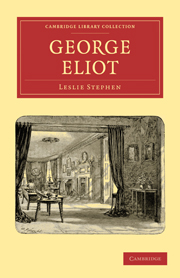Book contents
- Frontmatter
- Contents
- CHAPTER I EARLY LIFE
- CHAPTER II COVENTRY
- CHAPTER III “THE WESTMINSTER REVIEW”
- CHAPTER IV “SCENES OF CLERICAL LIFE”
- CHAPTER V “ADAM BEDE”
- CHAPTER VI “THE MILL ON THE FLOSS”
- CHAPTER VII “SILAS MARNER”
- CHAPTER VIII MIDDLE LIFE
- CHAPTER IX “ROMOLA”
- CHAPTER X “FELIX HOLT”
- CHAPTER XI “THE SPANISH GYPSY”
- CHAPTER XII “MIDDLEMARCH”
- CHAPTER XIII “DANIEL DERONDA”
- CHAPTER XIV CONCLUSION
- INDEX
- Frontmatter
- Contents
- CHAPTER I EARLY LIFE
- CHAPTER II COVENTRY
- CHAPTER III “THE WESTMINSTER REVIEW”
- CHAPTER IV “SCENES OF CLERICAL LIFE”
- CHAPTER V “ADAM BEDE”
- CHAPTER VI “THE MILL ON THE FLOSS”
- CHAPTER VII “SILAS MARNER”
- CHAPTER VIII MIDDLE LIFE
- CHAPTER IX “ROMOLA”
- CHAPTER X “FELIX HOLT”
- CHAPTER XI “THE SPANISH GYPSY”
- CHAPTER XII “MIDDLEMARCH”
- CHAPTER XIII “DANIEL DERONDA”
- CHAPTER XIV CONCLUSION
- INDEX
Summary
When George Eliot was just twenty-one a change took place in her life which was to produce most important results. Her brother had married, and it was arranged that he should take over his father's business at Griff. Mr. Robert Evans, now sixty-six, with his daughter migrated to Coventry. They took a semi-detached house in the Foleshill Road, with a “good bit of garden round it,” and commanding a wide reach of country, though the view was disfigured by mills and chimneys in the foreground. The secluded agricultural district was exchanged for an energetic manufacturing town, and George Eliot was gaining a new set of experiences, to be turned to account in good time. Hitherto her life had been one of intellectual isolation, though she had been encouraged by the sympathy of Miss Lewis. She had aspirations as well as reflections, and complains to her Methodist aunt that her “besetting sin was ambition—a desire insatiable for the esteem of my fellow-creatures. This seems the centre whence all my actions proceed.” But the powers of which she was conscious were choked in the confined atmosphere where men, as Johnson's friend complained, talked of “runts,” that is (according to Boswell) young cows. Dr. Johnson, replied an admirer, would learn to talk of runts. George Eliot certainly listened to the talk, and then or in memory could perceive its humorous aspect; but talk confined to runts becomes tiresome in the long run; and when her loftiest hope was to compile a historical chart, she must have felt a painful need for some better end for her energies.
- Type
- Chapter
- Information
- George Eliot , pp. 21 - 38Publisher: Cambridge University PressPrint publication year: 2010First published in: 1902

